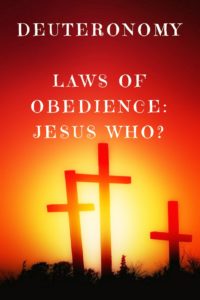We see Jesus represented as the Laws of Obedience in Deuteronomy. Matthew 5:17 tells us, Jesus came to fulfill the law. The two Hebrew names for Deuteronomy are ve’eleh hadevarim, “‘These are the words,'”  taken from the first words in the book and Mishneh Torah, “Repetition of the Torah” or ‘Second Law’, (Deuteronomy 17:18).
taken from the first words in the book and Mishneh Torah, “Repetition of the Torah” or ‘Second Law’, (Deuteronomy 17:18).
Jesus quoted from Deuteronomy more than any other Old Testament book. For example:
Matthew 4:4 – But Jesus told him, “No! The Scriptures say, ‘People do not live by bread alone, but by every word that comes from the mouth of God.’
Matthew 4:7 – Jesus responded, “The Scriptures also say, ‘You must not test the Lord your God.’
Matthew 4:10 – Get out of here, Satan,” Jesus told him. “For the Scriptures say, ‘You must worship the Lord your God and serve only him.’
Matthew 15:3-4 – Jesus replied, “And why do you, by your traditions, violate the direct commandments of God? For instance, God says, ‘Honor your father and mother, and ‘Anyone who speaks disrespectfully of father or mother must be put to death.’
Luke 18:20 – But to answer your question, you know the commandments: ‘You must not commit adultery. You must not murder. You must not steal. You must not testify falsely. Honor your father and mother.’
Matthew 22:37: Jesus replied, “‘You must love the Lord your God with all your heart, all your soul, and all your mind.’
Significant promises and ominous warnings are found in Deuteronomy 11:26-28:
“Look, today I am giving you the choice between a blessing and a curse! You will be blessed if you obey the commands of the Lord your God that I am giving you today. But you will be cursed if you reject the commands of the Lord your God and turn away from him and worship gods you have not known before.”
Deuteronomy is a discourse on the laws of obedience delivered by Moses before entering the Promised Land. It consists of three sermons and a narrative:
Deuteronomy 1 – 4: History and Warnings
Deuteronomy 4-26: Review of the Mosiac Law
Deuteronomy 27-30: Blessings and Curses
Deuteronomy 31-34: Death of Moses
Most important among the sermons are Deuteronomy 4-26 in which Moses expounds on the laws of obedience laid out for them and the consequences for not following those laws (Deuteronomy 28). These are what I call the ‘what ifs‘. We all live by ‘what ifs‘. We teach our children with ‘what ifs‘. You tell them ‘you can have dessert if you eat all of your vegetables. What ifs are a reality. What if you fail to pay your utility bill; you have no lights to light your house or gas to warm yourself. What if you ate nothing but pie every day; you will weight 400 pounds, and that would not be a good thing. What if you never read your Bible or went to church, you will be spiritually weak with no way to protect yourself from the enemy.
My friend and I had a conversation yesterday about a relative who was always complaining about being sick, in financial lack or being beaten up by the devil. My friend had given this relative the book ‘The Believer’s Authority’ a few months earlier, so my friend asked this relative, “Did you read the book I gave you?” Of course, the answer was always a resounding ‘NO‘. If you do not study the Word and put the Word inside of you, you cannot use the Word as a weapon against the enemy. Faith comes from hearing, hearing, and hearing the Word; then putting that Word into action. What ifs tell you what will happen if the laws of obedience are not obeyed.
Did you know that Moses and Israelites could have gone into the Promised Land within 11 days? Eleven days! Do you know why it took them 40 years? Because even after they had received and was instructed in the laws of obedience they chose to do otherwise. All God asked for was trust and they failed to deliver. God is always asking us to trust Him. Just trust me He tells us and then He starts telling us to remember why we can always trust Him. As He did for Moses (Exodus 33: 18-23) in the cleft of the rock, He does for us by proclaiming His names that we may know and trust Him:
- Jehovah-Jireh your Provider
- Jehovah-Shalom your Peace
- Jehovah-Nissi your Banner
- Jehovah-Rapha your Healer
- Jehovah-Raah your Shepherd
- Jehovah-Shammah the Lord who is There (Ever present)
- Jehovah-Tsidkenu your Righteousness
- Jehovah-Mekoddishkem your Sanctifier
How can we not trust and obey? Deuteronomy, the Second Law, is filled with wisdom. Jesus is the Prophet that Moses spoke of in Deuteronomy 18:15, the Redeemer in Deuteronomy 25:5-10 and our Refuge in Deuteronomy 19.
Hope you enjoyed learning about the Jesus of Deuteronomy. Next week we will learn about Jesus and Joshua. That will be a very exciting journey.
Disclosure: Many of the linked products and services I recommend are affiliate links, which means I may receive a small commission at no additional cost to you. As an Amazon Associate, I earn from qualifying purchases.
 tailored to align
tailored to align 